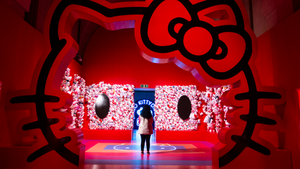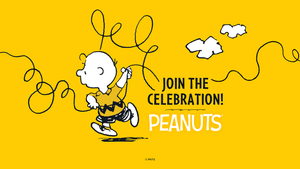Gary Carter
]> Chief creative officer FMX, FremantleMedia Think "new media" and you
April 6, 2018

]>
Chief creative officer FMX, FremantleMedia

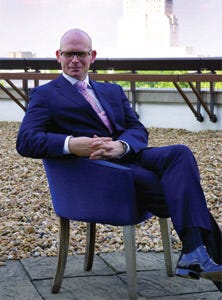
Think "new media" and you might think geek, anorak, tecchie. But not so Gary Carter, whose colourful appearance and distinctive eyewear reflect his broad and equally colourful interests. Once he starts to speak he reveals himself as a thinker and a visionary, unafraid to acknowledge the uncertainties surrounding the future of his business and dismissive of the inadequate language that exists to describe the changes going on so quickly within it. Well-read, prone to quote philosophers and draw parallels with flower arranging (a hobby of his), Gary has been called both guru and pretentious. Perfect attributies, you might say, for his role as head of FMX, where he combines crystal ball gazing with brave efforts to describe how the television of the future might look, and to guide content development for it.
Reassuringly, for the TV industry, he doesn't predict the death of television. Less reassuringly, for the licensing industry, his conclusions about how future television will be delivered, consumed and personalised have far-reaching implications for our traditional business model. We talked to him about why licensing in partnership with television will have to change or die.
Describe the work of your department, FMX
For some time now, Fremantle has been pondering what the future holds and trying to understand it. FMX is a division of Fremantle Media, principally concerned with content development and acquisition for the future. 

The term 'digital' future has different implications for different divisions of the company. The word digital itself is tricky - TV is already digital - but since the mid-90s people have been saying content is king and I think it is; you create new plumbing and then have to devise what goes down it.
What does the X stand for?
FMX develops forms of entertainment that have nothing to do with any existing TV or brands that Fremantle owns or controls.
At the moment, FMX defines itself in the absence of a technology. The technology is changing so fast so we threw out the notion of technology and looked at audience experience. Now we describe our mission as "developing and producing personalised and participatory media experiences."
We lean towards content, which means that from a business point of view we will always have to partner with other companies for delivery. Although we might develop a few applications in house, we can't work in isolation.
But we do make one assumption about technology. We assume that the default delivery mechanism for entertainment in the future will be broadband internet, probably wireless.
What is the 'futuristic' content you are developing?
By content I absolutely don't mean necessarily audio visual material.
What do you mean?
I mean personalised and participatory media experiences. Not necessarily moving pictures with sound per se, although they might be.
What might else they be?
Well, they might be little applications that allow you to fiddle with content; games structures overlaid on other content; certain types of interactive broadband internet websites, or game structures played over a whole set of media, for example. The killer application for the entertainment industry is to understand what new forms of entertainment can be enabled on new networks. That's what we're about: new forms on new networks.
In what context will these new forms of entertainment be launched?
I've spent most of my career in the rich trough of reality TV, from Survivor, to Big Brother to American Idol and I think reality TV is about the performance of the self. The balance of power between the producer and the subject is changing profoundly. The world that has opened up now is the logical extension of that process - a world where consumers make things with you and where producers become curators. 

Andy Warhol amended his comment that "in the future, every-one will be famous for 15 minutes" before he died to suggest that "in 15 minutes, everyone will be famous." That's closer to my understanding of the future.
Can you talk about specific projects?
We have a portfolio of projects - one example is called Enact, the slug line for which is: the mobile phone is your stage, TV is your backdrop and you are the star. It's an application that allows you to insert yourself in to the surface of TV. It's about any TV programme not just a specific show.
If we start creating our own TV, does it mean the communal TV-watching experience will disappear?
No. It means exactly the opposite. The communal TV experience will remain.
Everyone in the industry is still arguing about "is TV dead or not dead?" Actually, it's not dead nor dying. It's changing.
Why are you so sure that TV won't die?
There is nothing in the history of mass communication technology to say that one piece of technology causes the death of another, despite predictions that it might. Movies didn't kill the radio. TV did not kill the movies. The internet has not killed TV. And none of them has caused the death of the newspaper.
In the future, TV will become more important in 'mass' events, such as the World Cup or the outbreak of war. We're seeing it already. What will happen is a separation between global events and niche consumption.
We are living through the death of mainstream, and the death of time and space. By which I mean that TV is not dying but that the schedule is.
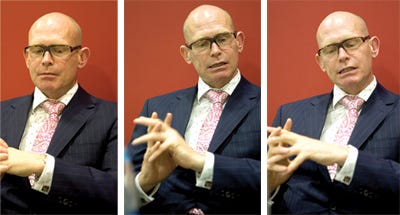
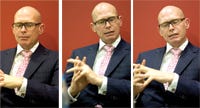
All mass communication technologies, follow the same pattern. All technology, for example, moves from the front door, or a relatively public space into a more personalised space. The telephone moved from the hallway and eventually into your pocket.
What are the steps that will take us from now into the 'future'?
It will just happen so there's no need to worry about the steps. Lots of this is very speculative and there's a tendency to over intellectualise, but that's the only way to treat it at the moment.
Will it be content or technology that drives the TV into our pocket?
Both. The word television means both the medium and the form. As screens get smaller, we have to grapple with the implications (as we're already doing, creating content for a mobile TV channel in the US, for example). How will TV people, making moving pictures with sounds, adjust their expectations? Profoundly. One of the things I like is that small screens will slow things down – hooray.
What lessons can the TV industry learn from the music industry?
To not be afraid of the future, and to embrace the audience's desire to create.
What is your insight into what television means to today's eight year old?
I don't think TV really features. For us it's called TV because that's the box it came in. For them, something comes to them across lots of media and it becomes just 'stuff'. In contrast, there are some things that really are television, such as war, or the World Cup.
It has less and less meaning to them in terms of content. Certainly, the way they consume it is multi-layered. We think they can listen to music, text, surf, chat online, play games and watch TV, apparently all at the same time. I don't actually believe that children absorb all these things simultaneously. I believe they have developed a generalisation skill and have just got very skilled at scanning and jumping. And given the quality of much media today, the only way to treat it is to scan.
Has this already had an effect on the freneticism of conventional TV?
Yes, it's a self-fulfilling prophecy. You watch an hour of TV in the US, for example, and probably only get a few minutes of content. Ads, pre-title summary of the series, trails, breaks, ... which is why you need to skip channels to find content.
Explain more about your phrase, 'creating spaces not places where audiences are free to play'.
The paradigm of the web, at around the time of the dotcom crash, was that you would go to a place (a webpage) where you would encounter information or entertainment.
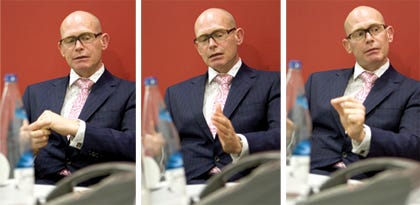

The paradigm of the new web or, rather, part of the practices of the new web world, are that web experiences are now three dimensional spaces, with communities, which allow flexible communication inside that space and therefore the ability to 'play'.
A good way to understand this is to visit www.flickr.com, a database of digital photos which is now generating game play among users, using those photos.
Is saying that the audience will decide how content will be used a cop out?
What I meant is that balance of power is shifting away from TV execs. The audience already has huge power. By not watching a show, for example, they can confine expensive hours of work to the rubbish bin. But they will also dictate how and when television will be consumed and in what forms. Soon they'll be able to edit a whole series themselves. I'm waiting for the day someone just puts a whole series on the internet and invites people to re-edit it to suit themselves. I do know some-one who is about to transmit a nonsensical two minutes of a popular programme online and ask the audience to un-jumble it, like a puzzle.
This is where we bump into copyright issues. I believe we mis-use copyright. It was brought into place in order to reward the creators of things and incentivise them to create more. But creativity is nothing without what's gone before and copyright mustn't be used to stifle it. I think you should reward the creator and then put the onus on the individual to refresh and renew.
Can you talk more about the current generation's understanding of what's real or not real on TV.
There are two kinds of games you can play, for example. There are representations of contests, which might include game shows, and there are contests of representations, which is the perfect definition of reality TV. For example, in Wifeswap, you ask two women to best represent motherhood in a contest. Or you ask Will Young to give his best possible representation of a pop star, which is then adjudicated by the audience. On a more abstract level, people are representing themselves, such as on Big Brother. And kids really get this.
Young people understand that reality is in the doing and personality is in the doing. We all know the rules and we're all engaged in minor contests of representation. Am I a good interviewee? Are you a good journalist?
To take another perspective, from the digital world, digital imagery is perfect only unto itself. Once I start interfering with the images, what's real? Even in very ordinary films now, the actors are performing and the surface has been so tampered with that it doesn't exist. Images in newspapers are generic rather than specific to a story, and more often than not they are manipulated.
So on a profound level, where is reality? Young people understand all this. But it freaks our generation because we thought television was about representing reality. That stopped in the 80s.
How does all this apply to children's television compared to game shows and reality TV, where it's already half way there?
I think that kids TV is a real sellout, the lowest of the low. Most of what kids get served up is marketing. It hooks into all the things that are brilliant about children's brains, such as their ability to understand complex stories and worlds, in order to sell to them. In the case of animation, animation is not about animation, its about building a brand to sell stuff. That's my initial reaction.

And I think that we've done something weird in the toy business. We have literalised children's ability to play and have a free imagination. But the ability to construct imaginary worlds is fundamental to our development. If I don't understand symbolism, how can I understand you? Where you used to have one doll to do everything, now you have lots, each with a specific role and outfit; that's not play, that's a collection.
These criticisms come often to our industry, but how do you see the children that are force-fed prescriptive toys growing up to be able to edit and personalise their own media?
Because they will go off and do other things – there will be a reaction to it. And the young have a great flexibility in their approach to new technology, they are fearless. I want to understand the rules and kids don't, they just want to explore the space, which is a much more useful way of approaching new media.
Are the Fremantle consumer products team interested in the projects FMX is developing?
The mobile team, yes, but consumer products, no, not yet. But they will be taking things to market, so they will be familiar with them soon. They are already very helpful with brokering relationships with partners, such as brands and technology companies.
Do you think that consumer products, ie physical extensions of the television experience, will play an important part in your future world?
Maybe, but I can't see that clearly at the moment - there's no sign of a product yet and I haven't bumped into any consumer goods possibilities.
So you're saying that TV isn't dead, but licensing is?!
But that you know. Core licensing is contracting isn't it? Actually it's an interesting question! I've never stopped to ask myself about it because we're not a product development division.
In licensing, we say the television experience is just one dimension of the brand and that consumers want to buy into it in different ways by wearing the t-shirt, drinking the drink, etc.
I can't believe this is really true! There are some very strong successes. But lots of TV merchandise doesn't sustain itself over time, it's just junk. It doesn't actually give you a sense of the original experience or make you feel part of or closer to the original experience. Sometimes it's not done with much clarity about what the original series means to the audience, it's off message.
In which case, why were so many millions of Daleks sold last year?
I think the Daleks are different. Coincidentally, I used to work for an agency that represented the Daleks and when I managed the Daleks we used to say, 'yes it can open your school fete as long as it can kill the headmistress. Daleks are the most feared creatures in the universe.'
I believe the longevity of the dalek as scary (and, boy, there are plenty of more scary things in the universe now) is because the agency watched it so carefully, in a very naïve way. The Daleks have entered the national consciousness. The junk I refer to is when we make a few episodes of a show and then endorse a few mugs.
So you agree that product can have a profound link to the brand?
Yes, but it's a question of understanding the brand in a deep way. This is our industry's problem not yours. I don't think lots of TV companies plan for brands. We're so driven by selling to broadcasters, it's hard to pull off the sort of careful brand management Celador did with Millionaire, for example. The lesson in this is not for licensees, it's for us. We must learn to say no more often.
How will our desire for products change, as we personalise and participate more in what we're consuming?
I expect this is where the rapid personalisation of product comes into it, such as having your own Nike shoes. Which runs contrary to something in the human nature where we all want to have the same thing.
What's your favourite TV programme of all time?
The first Dutch series of Big Brother.
Do you consume media by any futuristic methods?
The most up-to-date way I consume media is by downloading music onto my Mac.
What are the parallels between flower arranging and TV production?
All creative processes, whether flower arranging or television, require similar skills and ingredients. A sense of outline, a sense of light and shade, a sense of proportion and a sense of colour. Further, all creative processes require access to to what already exists: flower arranging requires there to be flowers and television requires the history of television in order to create new programmes.
You May Also Like


